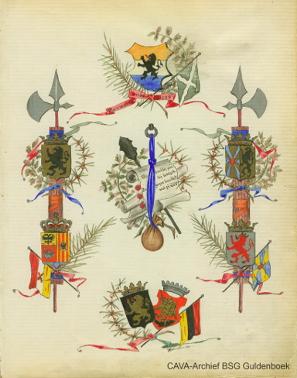
EXHIBITIONS
The Guldenboek ("Golden Book") of Geen Taal Geen Vrijheid, the predecessor of the Brussels Studentengenootschap, submitted by Frank Scheelings, coordinator of CAVA

The Guldenboek has been recognised by the Flemish government as a masterpiece. It received that status because it is a rare document with a special aesthetic, artistic and scientific value. It bears witness to a number of historical evolutions such as the transition of the Flemish Movement from a cultural movement to a political and social movement. It also shows how a number of students linked Flemish identity to a secular humanist and progressive body of thought and thus formed a progressive wing in the Flemish Movement. It exposes the political, cultural and social networks of young Flemish intellectuals between 1880 and WWI in a former Flemish city, Brussels which at that time was barely Frenchified, and at the same time testifies to the Frenchification. All this makes it of great significance for the collective memory in Flanders.
The Guldenboek contains the statutes, the programme and the 'confession of faith' (a declaration of commitment signed by the members testifying to a free spirit), the activities, annual reports and lists of presidents, honorary members and visitors of the Brussels student association Geen Taal Geen Vrijheid (“No Language No Freedom”). You will find many well-known names of illustrious Flemish and Dutch people who studied at the ULB, such as Lodewijk De Raet, August Vermeylen, Nico Gunzburg, Frederik Carel Gerretson, Herman Teirlinck, Emmanuel Hiel, Julius Hoste (father and son).
The many (annual) reports, lists of names, photos, drawings, invitations, menus, etc. give an idea of the ins and outs of the student association. From balls to political actions, from cultural lectures to the struggle for (higher) education in Dutch, from cantuses to both loyal resistance and activism during the First World War.

